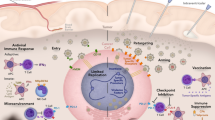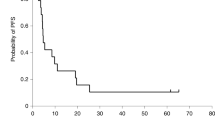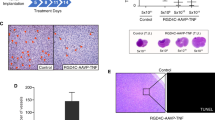Abstract
The herpes simplex virus (HSV) recombinant virus R7020 is an attenuated virus designed as a candidate for immunization against both HSV-1 and HSV-2 infections. It was extensively tested in an experimental animal system and in a healthy human adult population without significant untoward effects. We report on the use of R7020 with ionizing radiation as an oncolytic agent for hepatomas. Two hepatoma cell lines were studied, Hep3B and Huh7. R7020 replicated to higher titers in Hep3B cells than in Huh7 cells. Tissue culture studies correlated with hepatoma xenograft responses to R7020. R7020 was more effective in mediating Hep3B tumor xenograft regression compared with Huh7. Ionizing radiation combined with R7020 also showed differential results in antitumor efficacy between the two cell lines in tumor xenografts. Ionizing radiation enhanced the replication of R7020 in Hep3B xenografts. Moreover, the combination of ionizing radiation and virus caused a greater regression of xenograft volume than either R7020 or radiation alone. Ionizing radiation had no effect on the replication of R7020 virus in Huh7 xenografts. These results indicate that a regimen involving infection with an appropriate herpesvirus such as R7020 in combination with ionizing radiation can be highly effective in eradicating certain tumor xenografts.
This is a preview of subscription content, access via your institution
Access options
Subscribe to this journal
Receive 12 print issues and online access
$259.00 per year
only $21.58 per issue
Buy this article
- Purchase on Springer Link
- Instant access to full article PDF
Prices may be subject to local taxes which are calculated during checkout





Similar content being viewed by others
References
Martuza R.L. et al. Experimental therapy of human glioma by means of a genetically engineered virus mutant Science 1991 252: 854 854
Bischoff J.R. et al. An adenovirus mutant that replicates selectively in p53-deficient human tumor cells Science 1996 274: 373 373
Coffey M.C., Strong J.E., Forsyth P.A., Lee P.W. . Reovirus therapy of tumors with activated Ras pathway Science 1998 282: 1332 1332
Mineta T., Rabkin S.D., Martuza R.L. . Treatment of malignant gliomas using ganciclovir-hypersensitive ribonucleotide reductase-deficient herpes simplex viral mutant Cancer Res 1994 54: 3963 3963
Mineta T. et al. Attenuated multimutated herpes simplex virus-1 for the treatment of malignant gliomas Nat Med 1995 1: 938 938
Chambers R. et al. Comparison of genetically engineered herpes simplex viruses for the treatment of brain tumors in a scid mouse model of human malignant glioma Proc Natl Acad Sci USA 1995 92: 1411 1411
Andreansky S. et al. Evaluation of genetically engineered herpes simplex viruses as oncolytic agents for human malignant brain tumors Cancer Res 1997 57: 1502 1502
Chou J., Kern E.R., Whitley R.J., Roizman B. . Mapping of herpes simplex virus-1 neurovirulence to gamma1 34.5, a gene nonessential for growth in culture Science 1990 250: 1262 1262
Roizman B. . The function of herpes simplex virus genes: a primer for genetic engineering of novel vectors Proc Natl Acad Sci USA 1996 93: 11307 11307
Walker J.R. et al. Local and systemic therapy of human prostate adenocarcinoma with the conditionally replicating herpes simplex virus vector G207 Hum Gene Ther 1999 10: 2237 2237
Kooby D.A. et al. Oncolytic viral therapy for human colorectal cancer and liver metastases using a multi-mutated herpes simplex virus type-1 (G207) FASEB J 1999 13: 1325 1325
Lee J.H., Federoff H.J., Schoeniger L.O. . G207, modified herpes simplex virus type 1, kills human pancreatic cancer cells in vitro J Gastrointest Surg 1999 3: 127 127
Carew J.F. et al. Selective infection and cytolysis of human head and neck squamous cell carcinoma with sparing of normal mucosa by a cytotoxic herpes simplex virus type 1 (G207) Hum Gene Ther 1999 10: 1599 1599
Meignier B., Longnecker R., Roizman B. . In vivo behavior of genetically engineered herpes simplex viruses R7017 and R7020: construction and evaluation in rodents J Infect Dis 1988 158: 602 602
Meignier B., Martin B., Whitley R.J., Roizman B. . In vivo behavior of genetically engineered herpes simplex viruses R7017 and R7020. II. Studies in immunocompetent and immunosuppressed owl monkeys (Aotus trivirgatus) J Infect Dis 1990 162: 313 313
Advani S.J. et al. Replication-competent nonneuroinvasive genetically engineered herpes virus is highly effective in the treatment of therapy-resistant experimental human tumors Cancer Res 1999 59: 2055 2055
Delman K.A. et al. Effects of preexisting immunity on the response to herpes simplex-based oncolytic viral therapy Hum Gene Ther 2000 11: 2465 2465
Cozzi P.J. et al. Intravesical oncolytic viral therapy using attenuated, replication-competent herpes simplex viruses G207 and Nv1020 is effective in the treatment of bladder cancer in an orthotopic syngeneic model FASEB J 2001 15: 1306 1306
Advani S.J. et al. Enhancement of replication of genetically engineered herpes simplex viruses by ionizing radiation: a new paradigm for destruction of therapeutically intractable tumors Gene Therapy 1998 5: 160 160
Bradley J.D. et al. Ionizing radiation improves survival in mice bearing intracranial high-grade gliomas injected with genetically modified herpes simplex virus Clin Cancer Res 1999 5: 1517 1517
Markert J.M. et al. Genetically engineered HSV in the treatment of glioma: a review Rev Med Virol 2000 10: 17 17
Market J.M. et al. Conditionally replicating herpes simplex virus mutant G207 for the treatment of malignant glioma: results of a phase I trial Gene Therapy 2000 7: 867 867
Heise C. et al. ONYX-015, an E1B gene-attenuated adenovirus, causes tumor-specific cytolysis and antitumoral efficacy that can be augmented by standard chemotherapeutic agents Nat Med 1997 3: 639 639
Khuri F.R. et al. A controlled trial of intratumoral ONYX-015, a selectively-replicating adenovirus, in combination with cisplatin and 5-fluorouracil in patients with recurrent head and neck cancer Nat Med 2000 6: 879 879
Chahlavi A., Todo T., Martuza R.L., Rabkin S.D. . Replication-competent herpes simplex virus vector G207 and cisplatin combination therapy for head and neck squamous cell carcinoma Neoplasia 1999 1: 162 162
Advani S.J., Chmura S.J., Weichselbaum R.R. . Radiogenetic therapy: on the interaction of viral therapy and ionizing radiation for improving local control of tumors Semin Oncol 1997 24: 633 633
Rogulski K.R. et al. In vivo antitumor activity of ONYX-015 is influenced by p53 status and is augmented by radiotherapy Cancer Res 2000 60: 1193 1193
Hallahan D.E. et al. Spatial and temporal control of gene therapy using ionizing radiation Nat Med 1995 1: 786 786
Acknowledgements
We thank Samuel Hellman for invaluable discussions. These studies were aided by a grant from the National Cancer Institute (PO1 CA71933).
Author information
Authors and Affiliations
Rights and permissions
About this article
Cite this article
Chung, SM., Advani, S., Bradley, J. et al. The use of a genetically engineered herpes simplex virus (R7020) with ionizing radiation for experimental hepatoma. Gene Ther 9, 75–80 (2002). https://doi.org/10.1038/sj.gt.3301620
Received:
Accepted:
Published:
Issue Date:
DOI: https://doi.org/10.1038/sj.gt.3301620
Keywords
This article is cited by
-
Enhanced efficacy with azacytidine and oncolytic BHV-1 in a tolerized cotton rat model of breast adenocarcinoma
Molecular Therapy - Oncolytics (2015)
-
Clinical development directions in oncolytic viral therapy
Cancer Gene Therapy (2011)
-
Escherichia coli nitroreductase plus CB1954 enhances the effect of radiotherapy in vitro and in vivo
Gene Therapy (2008)
-
Herpes simplex virus 1 (HSV-1) for cancer treatment
Cancer Gene Therapy (2006)
-
Treatment of cholangiocarcinoma with oncolytic herpes simplex virus combined with external beam radiation therapy
Cancer Gene Therapy (2006)



